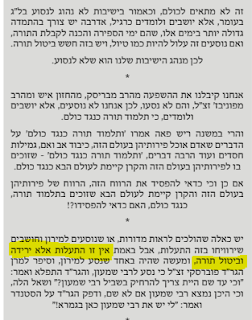The gemara (Gittin 60b) darshens that one is not permitted to write down torah sheba'al peh and one is not permitted to recite by heart torah sheb'ksav:
רש רבי יהודה בר נחמני מתורגמניה דרבי שמעון בן לקיש כתיב כתוב לך את הדברים האלה וכתיב כי ע"פ הדברים האלה הא כיצד דברים שבכתב אי אתה רשאי לאומרן על פה דברים שבעל פה אי אתה רשאי לאומרן בכתב
Rash in a few places (e.g. Shabbos 6b, B"M 92) writes that the Tanaim/Amoraim would keep private notebooks of chiddushim that they heard and wanted to remember because the din of not writing torah sheba'al peh applies only to torah that is read b'tzibur, not to one's private notes:
מגילת סתרים. שהסתירוה מפני שלא ניתנה ליכתוב וכששומעין דברי יחיד חדשים שאינן נשנין בב"ה וכותבין אותן שלא ישתכחו מסתירין את המגילה
Why should that be true? Why should the context or the use being made of the text make any difference?
Rav Wahrman in his She'eiris Yosef vol 3 (siman 4)quotes a Yerushalmi in Meg 4:1
רִבִּי שְׁמוּאֵל בַּר רַב יִצְחָק עָאַל לַכְּנִישְׁתָּא. חַד בַּר נַשׁ קָאִים מְתַרְגֵּם סְמִיךְ לָעֲמוּדָא. אֲמַר לֵיהּ. אָסוּר לָךְ. כְּשֵׁם שֶׁנִּיתְנָה בְּאֵימָה וְיִרְאָה כָּךְ אָנוּ צְרִיכִין לִנְהוֹג בָּהּ בְּאֵימָה וְיִרְאָה. רִבִּי חַגַּי אָמַר. רִבִּי שְׁמוּאֵל בַּר רַב יִצְחָק עָאַל לַכְּנִישְׁתָּא. חֲמָא חוּנָה קָאִים מְתַרְגֵּם וְלָא מֵקִים בַּר נַשׁ תַּחְתּוֹי. אֲמַר לֵיהּ. אֲסִיר לָךְ. כְּשֵׁם שֶׁנִּתְנָה עַל יְדֵי סִרְסוּר כָּךְ אָנוּ צְרִיכִין לִנְהוֹג בָּהּ עַל יְדֵי סִרְסוּר. עָאַל רִבִּי יוּדָה בַּר פָּזִי וְעָֽבְדָהּ שְׁאֵילָה. אָֽ֠נֹכִ֠י עוֹמֵד בֵּין־י ֨י וּבֵֽינֵיכֶם֙ בָּעֵ֣ת הַהִיא לְהַגִּ֥יד לָכֶם֭ אֶת־דְּבַ֣ר י ֨י. רִבִּי חַגַּיי אָמַר. רִבִּי שְׁמוּאֵל בַּר רַב יִצְחָק עָאַל לַכְּנִישְׁתָּא. חֲמָא חַד סְפַר מוֹשִׁט תַּרְגוּמָא מִן גַּו סִיפְרָא. אֲמַר לֵיהּ. אֲסִיר לָךְ. דְּבָרִים שֶׁנֶּאֶמְרוּ בַפֶּה בַפֶּה וּדְבָרִים שֶׁנֶּאֶמְרוּ בִכִתָב בִּכְתָב.
Rebbi Samuel bar Rav Isaac went to a synagogue. A man stood up to translate while leaning on a pillar. He said to him, this is forbidden to you; just as it was given in trembling and fear so we have to treat it in trembling and fear. Rebbi Ḥaggai said, Rebbi Samuel bar Rav Isaac went to a synagogue. He saw Huna standing up translating without putting up another person in his stead. He said to him, this is forbidden to you; just as it was given by an agent, so we have to treat it by an agent. Rebbi Jehudah bar Pazi went and turned it into a question, I was standing between the Eternal and you at that time to tell you the Eternal’s word. Rebbi Ḥaggai said, Rebbi Samuel bar Rav Isaac went to a synagogue. He saw a teacher delivering the translation from a book. He said to him, this is forbidden to you; matters which were said orally orally, matters which were said in writing in writing.
The Yerushalmi lumps together three halachos: the turgeman is not allowed to lean when translating; there has to be a turgeman; our halacha that torah shebaal peh must be said only baal peh and not from a text. The first two halachos are based on how Torah was given at Sinai. Just as Moshe acted as an intermediary, so too, a turgeman is needed as an intermediary; just as the Torah was given with awe and trembling, so too, we must be in a state of awe when it is read. Rav Wahrman suggests that the third halacha of our sugya, that torah shebaal peh cannot be written, is also rooted in the same idea. The text and the oral explanation have to be preserved as-is so that the transmission of Torah is done in a way that is consistent with how Torah was given at Sinai. Therefore, the issur of writing torah sheb'ksav applies only when giving over Torah b'tzibur, as occurred at Sinai, but not to recording notes for private use.
Rama (Shu"T 34) writes that the Rishonim created what we call "ksav Rashi" because the issur of writing torah sheb'ksav only applies when done in ksav ashuri. Based on Rav Wahrman's hesber, this fits perfectly. Since Torah was given in ksav ashuri, the issur of writing torah sheb'ksav only applies if done in ksav ashuri.
Rav Wahrman further suggests that the din of כל פסוקא דלא פסקיה משה אנן לא פסקינן ליה (Meg 22), that one is not allowed to read half a pasuk, only applies b'tzibur and not b'yachid, as it also is based on the model of how Torah was given at Sinai. Some begin kiddush with "Vayehi erev...yom ha'shishi...," which is not a whole pasuk. If the issur of not breaking a pasuk applies only b'tzibur, this would not be a problem (same issue with saying "v'zos haTorah" during hagba, but that is said by the tzibur.)
The gemara (Tamid 32) records that the kohanim would read aseres hadibros has part of their davening in the mikdash. The gemara (Brachos 12) writes that they wanted to institute the same practice even outside the mikdash, but abandoned the idea lest people think the aseres ha'dibros was all that mattered. אף בגבולין בקשו לקרות כן אלא שכבר בטלום מפני תרעומת המינין There is a debate in poskim (see Rama OC 1 and Shaarei Teshuvah) whether an individual can recite aseres ha'dibros on his own. It may be that the Chachamim opposed the idea b'tzibur, imitating maamad Har Sinai, but a private recitation would not be a problem.

